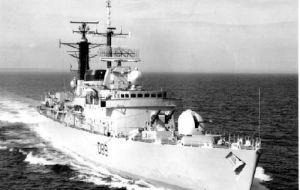MercoPress. South Atlantic News Agency
Falklands' veterans protest “disrespect” for HMS Exeter
 HMS Exeter
HMS Exeter Falkland Islands war veterans have accused the Royal Navy of disrespecting their sacrifice as HMS Exeter came home to a muted final welcome, according to a report from the Portsmouth News published August 5 and written by Defence correspondent Matt Jackson.
More than 100 people crowded the Round Tower in Portsmouth to salute the return of Britain's last warship from the 1982 conflict. But they were also there yesterday to highlight the lack of ceremony for the now mothballed Type 42 destroyer. Ron Hearn, 54, who was a Leading Seaman radar operator during the war, said: "This is a sad, sad day and I wish there could have been more to mark it. We all know she's not going to go out any more and that's the last of the Falklands warships out of the navy". "Surely we should have had the chance to say goodbye!" HMS Exeter will be formally decommissioned in May after spending the winter in Portsmouth with a skeleton crew and command. The navy says she still might be used, which is why a fly-past from two jets was the only ceremony this time. But that is not enough for the men who faced Argentine missile fire in the South Atlantic. Paul Harvey-Hunter, 55, a former Leading Seaman from Gosport who served in HMS Exeter for three years, said: 'We were just finishing our trials in the Caribbean when we were called to go straight to the Falklands. "We went straight into a war zone and there were several times when we were fired on, and it's a shame that protocol means the ship's bravery isn't being recognised. There were plenty of people who lost their lives in the Falklands and we want the navy to mark that". As well as anger there was pride from the dozens of ex-servicemen and their families, as they held banners aloft and cheered the current crew home. Former Leading Seaman Dean Deakins, 50, from Waterlooville bugled the Last Post as his old ship passed. He said: "We are very proud of the camaraderie we had on Exeter. "She had something no other ship had, and it is right that we celebrate the end of her time". According to the Royal Navy web site the present HMS Exeter is a Type 42 Destroyer and its primary role is to provide area air defense to a group of ships. Secondary roles are also to provide naval Gunfire Support, take part in anti-surface operations and provide an anti-submarine capability. As well as these aggressive capabilities, the Type 42 must also be capable of providing aid to civilian powers, disaster relief and any similar peace time duty that they may be called upon to perform. HMS Exeter was built by Swan Hunter Shipbuilders Limited. Her keel was laid down at Neptune Yard, Wallsend on 22 July 1976. Launched by Lady Joan Mulley on 25 April 1978, she was commissioned on 19 September 1980. Rarely far from the action HMS Exeter has maintained her tradition of war fighting prowess. She was awarded her seventh Battle Honor in the Falklands Conflict of 1982 where she was credited with four successful Sea Dart engagements, destroying two Argentine Skyhawks and two reconnaissance aircraft. Later in 1991 she was employed as an escort for a US Battleship and Mine Counter-Measures Units off the Kuwaiti coast during the Gulf War of 1991. In 2005 she took part in the International Fleet Review to mark the 200th Anniversary of the Battle of Trafalgar. The fourth HMS Exeter was also linked to the Falkland Islands. As a cruiser with six 8-inch and four 4-inch guns Exeter's won her fifth Battle Honor at the Battle of the River Plate on 13 December 1939 during which the intrepidity and coolness of officers and men alike was in the Captain's word, 'Superb'. It was not the Germans who eventually defeated Exeter but the Japanese, at the Battle of the Java Sea who sank her on 1 March 1942.




Top Comments
Disclaimer & comment rulesCommenting for this story is now closed.
If you have a Facebook account, become a fan and comment on our Facebook Page!